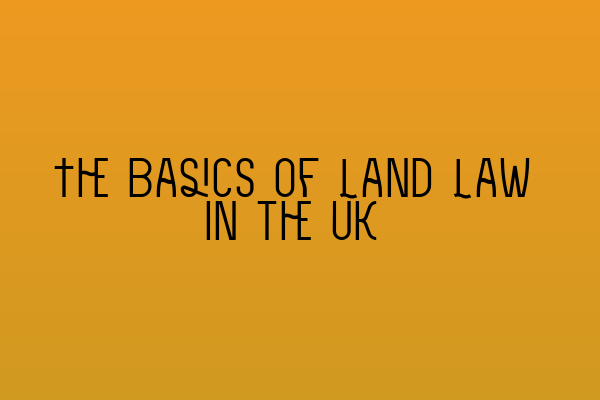Welcome to SQE Property Law & Land Law, where we provide expert legal advice and services in the field of land law in the UK. Whether you’re a property owner, tenant, landlord, or aspiring legal professional, understanding the basics of land law is essential. In this blog post, we will guide you through the key concepts and principles of land law in the UK, giving you a solid foundation to navigate the complexities of property ownership and transactions.
**1. Introduction to Land Law**
Land law refers to the set of legal rules and regulations that govern the ownership, use, and transfer of land and property. It is a fundamental branch of law that underpins various aspects of our daily lives, such as buying and selling property, leasing agreements, and resolving property disputes. Having a good grasp of land law is crucial to protect your property rights and make informed decisions.
**2. Types of Property**
In the UK, land can be categorized into two main types: freehold and leasehold. Freehold property ownership gives the owner complete rights and control over the land indefinitely. Leasehold, on the other hand, grants a person the right to use and occupy a property for a specific period, often subject to payment of rent and other obligations to the freehold owner.
To delve deeper into the different types of property ownership and their implications, check out our comprehensive article on [SQE 1 Practice Exam Questions](https://fqps.co.uk/sqe/sqe1-preparation/mcq-practice-quiz).
**3. Registered and Unregistered Land**
In the UK, land can be registered or unregistered. Registered land means that its ownership and other interests are recorded in the Land Registry, providing certainty and security of title. On the other hand, unregistered land does not have an official record of its ownership, and establishing ownership can be more complex.
For a detailed exploration of the registration process and its significance, our article on [SQE 1 Practice Mocks FLK1 FLK2](https://fqps.co.uk/sqe/sqe1-preparation/practice-mocks-quiz) can provide valuable insights.
**4. Co-ownership**
When two or more individuals or entities jointly own a property, it is referred to as co-ownership. Co-ownership can take different forms, such as joint tenancies and tenancies in common. The type of co-ownership affects how the property is held and what happens upon the death of one of the co-owners.
To deepen your understanding of co-ownership and its various aspects, we recommend exploring our article on [SQE 2 Preparation Courses](https://fqps.co.uk/sqe/sqe2-preparation).
**5. Easements and Covenants**
Easements and covenants are rights and obligations that run with the land, meaning they are attached to the property and pass on to subsequent owners. Easements are rights that allow a person to use another person’s land for a specific purpose, while covenants are obligations that restrict the use or require certain actions regarding the land.
For a comprehensive overview of easements and covenants, including examples and practical applications, visit our article on [SQE 1 Preparation Courses](https://fqps.co.uk/sqe/sqe1-preparation).
**6. Adverse Possession**
Adverse possession is a legal concept that allows a person to acquire ownership of land through continuous and uninterrupted occupation of the land for a specified period, usually 10 or 12 years. Adverse possession can arise when someone occupies the land without the permission or knowledge of the true owner.
For a comprehensive understanding of adverse possession and its implications, we suggest reading our article on [SRA SQE Exam Dates](https://fqps.co.uk/sqe/sqe1-sqe2-exam-dates).
**Conclusion**
Understanding the basics of land law is essential for anyone dealing with property in the UK. It provides the foundation for protecting property rights, conducting transactions, and resolving disputes. By familiarizing yourself with the key concepts of land law, you can navigate the legal landscape with confidence.
If you’re preparing for the SQE exams and seeking further resources to enhance your knowledge and practice, we invite you to explore our related articles on SQE 1 Practice Exam Questions, SQE 1 Practice Mocks FLK1 FLK2, SQE 2 Preparation Courses, and SQE 1 Preparation Courses.
At SQE Property Law & Land Law, we are here to assist you with expert legal advice and support. Contact us today to discuss your land law needs and benefit from our professional services.
